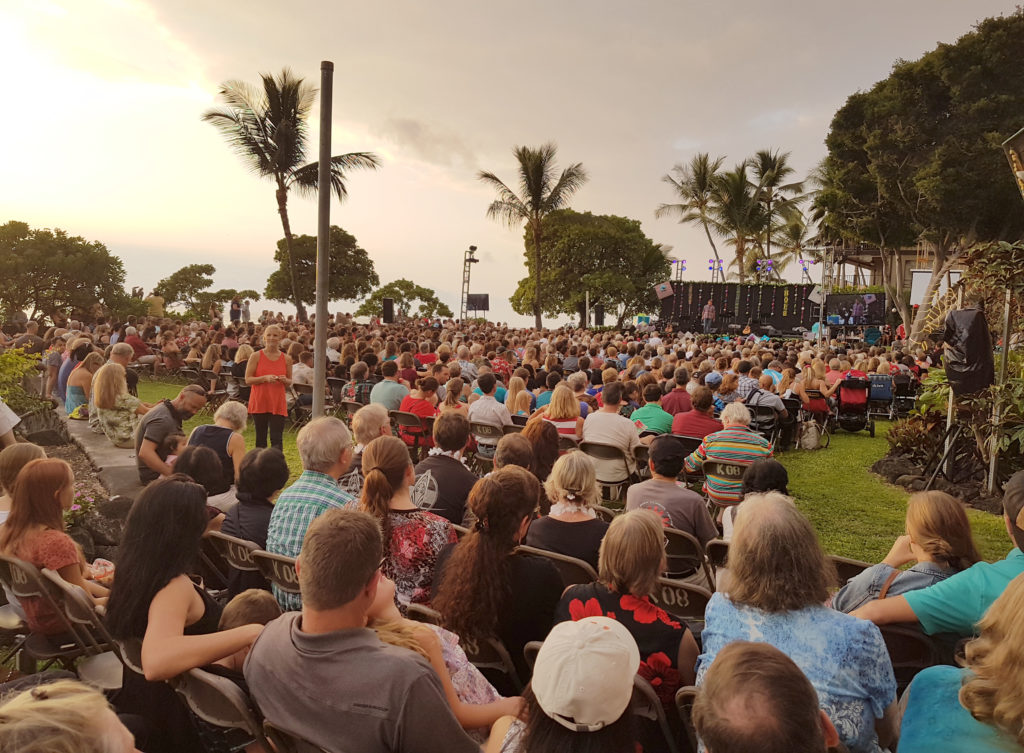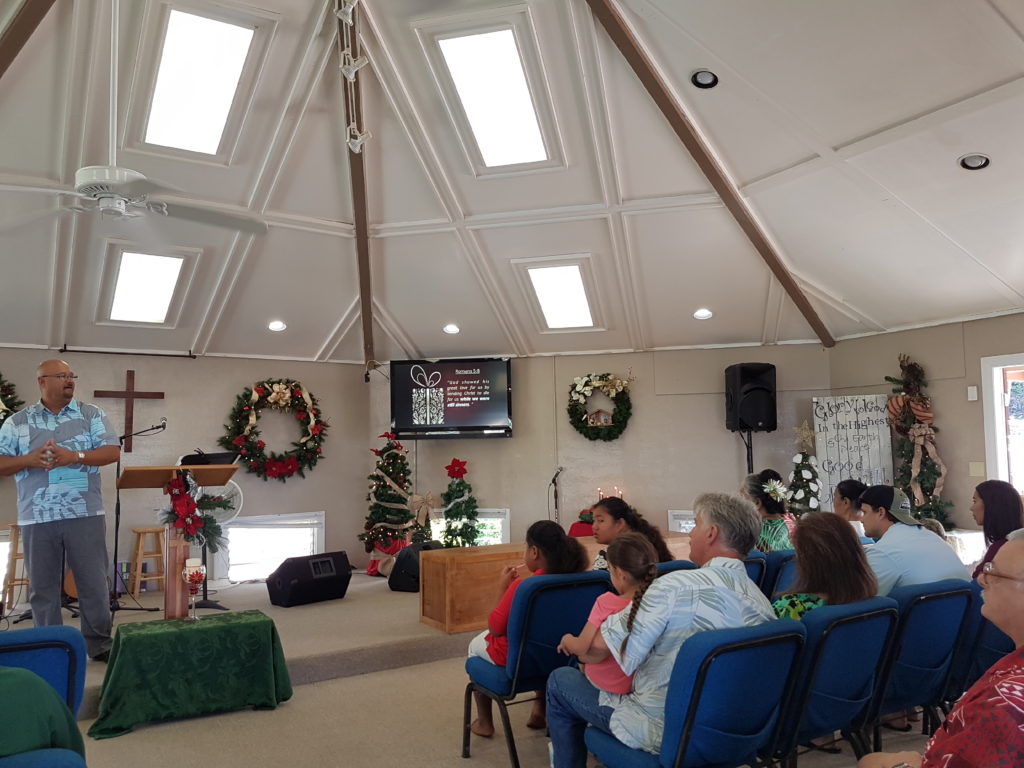For the first time in I don’t know how many years I worshipped – in a manner of speaking that I will get to later – on Christmas Eve at a church other than my home church, St. Hilda’s. It wasn’t even an Anglican church!
There is no ACNA church in the area, so that was not an option; we could have attended a TEC parish, I suppose, but my wife gets upset when I stand up in the middle of the sermon to contradict the preacher, so that was not an option either. We attended a community church that met on the beach.
Since I lead the musical part of the worship at St. Hilda’s, I have a keen interest in how others do it. In this case, the music, although the style and content was not entirely to my taste (surely “Little Drummer Boy” could be left in the hands of secular merchants), was performed with precision and great expertise. Sadly, though, the first half hour or so – the whole thing was exactly one hour – was Christianity lite entertainment. The congregation did not sing but they did applaud at the end of each act. We, not God, were the audience, the activity was one of aesthetics, a transference of pleasing feelings, not worship: congregational worship requires more and different participation than clapping at the end of a song.
Similarly, the dancing was, to my eye, at a professional level. I hesitate to call it “liturgical dancing” since it included – so my wife tells me – break dancing and other gyrations which defied the best efforts of both of us to identify.
This was not a liturgical church so there was no explicit liturgy. There was a tightly adhered to script, though, whose timing was mercilessly rigid but lacked the elements I’ve become accustomed to thinking comprise complete and satisfying worship – the Eucharist, Creed, Confession for example
The sermon occupied almost half the time. It was a simple, accurate and pure Gospel message. The preacher told us that Jesus was God, was born as man and died for our sin to save us from going to hell. There were about a thousand people there to hear that message. The same thing was repeated an hour later to, I expect, a similar sized crowd.
The sound, lighting, performers and setting (on the beach – we are in Hawaii, after all) were all impeccable. Police were on the road – paid their overtime by the church, I presume – dozens of ushers were in the parking lot, greeters were smiling, multiple giant TVs were relaying the activity on the stage and…. the rain waited until everything was over.
I left wondering whether this is the future of Western Christianity: entice people to church by entertaining them and hit them with the Gospel after they have been lulled into a receptive frame of mind by the lights and cabaret dazzling their senses.
I hope not, because I am not temperamentally equipped to consume it. I fear it may be so, though.
Here is a cell phone photo of the crowd.

December 25
After attending a Christmas morning service at a different church, I thought I should write an addendum to this post.
This was another congregational church, so I still missed our liturgy with all its drama of the Christian story but, unlike last night, it was a small, warm and welcoming congregation of around 50 – 60 people. The music leaders were less polished, sometimes the words on the screen were out of sync, the congregation didn’t just listen, we sang, many people strolled in late, there was no need for traffic directing police and there were home made cookies following the service; I felt quite at home. Once again, the Gospel was preached quite explicitly.
So, just as our ultimate hope rests in the Christmas Child, I think there is still hope for his church. Even in the rapidly decaying West.
Another cell phone photo:



Even only one person is saved by the preaching of the pure Gospel, the whole experience can be of some value. I do agree with you that we should not forget that the audience of our worship is God alone.
I appreciated this Christmas reflection and found it thought-provoking.
I have come to the conclusion that churches in the 21st century (at least in the West) approach worship – which has almost become a buzzword – mostly incorrectly. The starting point is wrong and therefore the conclusions that follow are also wrong.
Too often the starting point is to get people to attend. Or to increase membership. And to do this quickly. Of course Christians want to convert people. Of course we love the idea of a big church with lots of fellow believers. But numbers and getting attention should never be the starting philosophy.
I’ve followed a number of churches that have started with an entirely different premise: we want to be pleasing to God. One church that I know of in Texas began with four people. For a couple of years it was only four people, meeting together. But, committed to careful evangelism, putting their confidence in prayer, and working at it, building a real church of friends who regularly fellowship together, they have grown into a church with tremendous influence around the world. And they did not use entertainment.
The use of entertainment in worship is ultimately destructive, I think, of a sense of awe and the mystery of spiritual communion that humbles and invites a heartfelt submission to God. It makes me wonder about the quality of the converts such a system could produce. After all, what you win them with, you win them to.
Perhaps the problem lies partly in expecting a Christian gathering to consist entirely of worship. When NT prophets prophesied, and the people listened to the prophecies, they were not worshipping, they were being ministered to. When people were taught, they were not worshipping, their souls were being fed; when preachers preached, the people who listened were not worshipping, they were being challenged to believe on Jesus, etc.
I appreciated what David had to say. Of course the sermon is one of the climaxes of the service along with a dignified celebration of the sacrament which I find often lacking in many non-liturgical churches (along with confession, the creed and the Lord’s Prayer).
Martin Luther often wrote comparing what he called “the theology of glory verses the theology of the cross.” Naturally he favoured the theology of the cross because he thought that Jesus came to earth for one reason and one reason only; to die for our sins. The entertainment aspect of many of the so-called “mega churches” clearly demonstrates a theology of glory premise, emphasizing the joy and fun of being at Christian worship and the good life that being a Christian can provide.
But for me, when I asked Jesus to come into my life, he did not come alone. He brought with him the poor and the downtrodden, the oppressed and the forgotten, the sinner who at times is impossible to love emotionally and numerous enemies who I needed to forgive and try to love. Rather than giving me a rosy view of the world, Christ slapped me square in the face as to how much his dying was necessary, especially for me, maggot dung that I am.